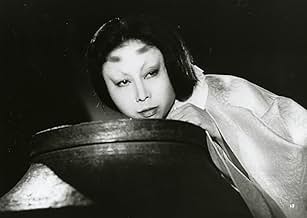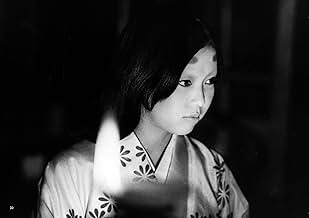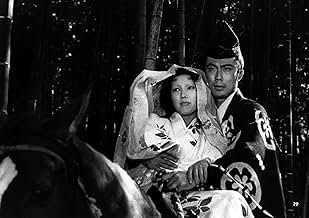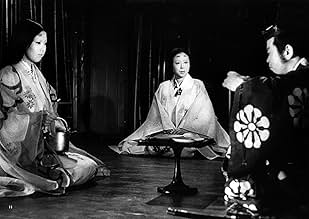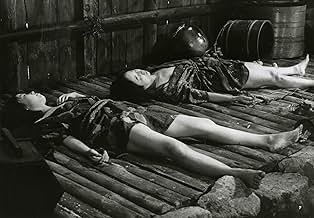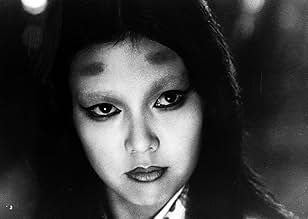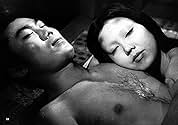IMDb RATING
7.7/10
9.5K
YOUR RATING
Two women are raped and killed by samurai soldiers. Soon they reappear as vengeful ghosts who seduce and brutally murder the passing samurai.Two women are raped and killed by samurai soldiers. Soon they reappear as vengeful ghosts who seduce and brutally murder the passing samurai.Two women are raped and killed by samurai soldiers. Soon they reappear as vengeful ghosts who seduce and brutally murder the passing samurai.
- Awards
- 2 wins total
- Director
- Writer
- All cast & crew
- Production, box office & more at IMDbPro
Featured reviews
THE SYNOPSIS In warring feudal Japan, a group of marauding Samurai seeking food exits the forest where they come across a house that should have what they require. On entering the house they find it has what they want and a lot more
.it has women too. The inhabitants an elderly woman and her daughter in law are both subjected to continuous rape as each Samurai takes their turn, the others plunder the women's food stocks.After the Samurai have satiated their appetites,they leave the women, now unconscious for dead and set fire to their home as they flee.When the fire eventually burns out all we see are the burned and battered bodies of the women and their helpless black kitten as it licks their wounds.
Rajomon Gate .a Samurai approaches on horseback and is met by a spectral vision of a woman, who tells him she is too afraid to make her journey home because she has to pass the Bamboo Grove, which is a haven for bandits and highwaymen. The Samurai agrees to accompany her to her home, where he is plied with sake. The Daughter in laws husband Hachi, we learn has been at war for three years and has still not returned The daughter in law then proceeds to seduce the Samurai, before she brutally attacks him, devouring his throat and sucking his blood ..for we learn that the two women are in fact the newly embodied spirits of the dead women murdered by the Samurai who have made a pact with the Evil Gods/Spirits, who have allowed them life, on condition that they murder all Samurai who pass their way.
Far to the East, a sole warrior named Hachi is all that remains after a massive and bloody battle.Hachi returns home to find his home burned and his family missing, he seeks employment from the Samurai leader at Rajomon Gate named Raiko, who after hearing Hachi's brave stories takes him on. Hachi's first task is to rid the area of the spectral beasts that have been claiming the lives of his warriors ..and so Hachi sets off unknowingly to kill his own family.
THE REVIEW Unquestionably a companion piece to Onibaba, a film by the same Director it was made to cash in on the success of Onibaba which had been met by a wave of good criticism in the west .and also because Shindo's other contemporary works had been less critically received mainly due to their overtly sexual content. Kiyomi Kuroda's award winning cinematography sets the tone for this film, its Chiaroscuro/Noir visuals are nothing short of breathtaking. The underlying tragic story of lost love is also dealt with brilliantly by Shindo who is on fine form again .the story is compelling except for the first twenty minutes which became a bit repetitive as Samurai after Samurai was seduced and killed by the women, but this ploy was used to bring the story forward so I wont criticize too much.All in all, a worthwhile buy if you like Onibaba or Asian Cinema,but the DVD despite the films stunning print is very bare.
Rajomon Gate .a Samurai approaches on horseback and is met by a spectral vision of a woman, who tells him she is too afraid to make her journey home because she has to pass the Bamboo Grove, which is a haven for bandits and highwaymen. The Samurai agrees to accompany her to her home, where he is plied with sake. The Daughter in laws husband Hachi, we learn has been at war for three years and has still not returned The daughter in law then proceeds to seduce the Samurai, before she brutally attacks him, devouring his throat and sucking his blood ..for we learn that the two women are in fact the newly embodied spirits of the dead women murdered by the Samurai who have made a pact with the Evil Gods/Spirits, who have allowed them life, on condition that they murder all Samurai who pass their way.
Far to the East, a sole warrior named Hachi is all that remains after a massive and bloody battle.Hachi returns home to find his home burned and his family missing, he seeks employment from the Samurai leader at Rajomon Gate named Raiko, who after hearing Hachi's brave stories takes him on. Hachi's first task is to rid the area of the spectral beasts that have been claiming the lives of his warriors ..and so Hachi sets off unknowingly to kill his own family.
THE REVIEW Unquestionably a companion piece to Onibaba, a film by the same Director it was made to cash in on the success of Onibaba which had been met by a wave of good criticism in the west .and also because Shindo's other contemporary works had been less critically received mainly due to their overtly sexual content. Kiyomi Kuroda's award winning cinematography sets the tone for this film, its Chiaroscuro/Noir visuals are nothing short of breathtaking. The underlying tragic story of lost love is also dealt with brilliantly by Shindo who is on fine form again .the story is compelling except for the first twenty minutes which became a bit repetitive as Samurai after Samurai was seduced and killed by the women, but this ploy was used to bring the story forward so I wont criticize too much.All in all, a worthwhile buy if you like Onibaba or Asian Cinema,but the DVD despite the films stunning print is very bare.
This is Japanese period piece of supernatural horror directed by Kaneto Shindo (Onibaba), based on a traditional folktale. During a time of widespread warfare, a woman (Nobuko Otowa) lives in an isolated farmhouse with her daughter-in-law Shige (Kiwako Taichi). The woman's son, and Shige's husband, Gintoki (Kichiemon Nakamura) have been conscripted in the war, so the ladies are alone when a band of samurai pass by and decide to raid the house for food, only to assault and kill both women while they're at it. Several years later, many of those samurai have risen to positions of importance, only a pair of ghostly women have begun killing them one by one. Gintoki, unaware of the fates of his wife and mother, is ordered to investigate the killings.
Like Shindo's earlier Onibaba, this features terrific B&W cinematography and very effective atmosphere. The acting by the three leads is also very good. This would make a great triple bill with Onibaba and Kwaidan.
Like Shindo's earlier Onibaba, this features terrific B&W cinematography and very effective atmosphere. The acting by the three leads is also very good. This would make a great triple bill with Onibaba and Kwaidan.
Today I want to talk about Kuroneko (The Black cat in english). For anybody who doesn't know about this Japanese classic, I want to say: what? Are you crazy? I'm just kidding, but seriously you cannot miss this incredible film. It tells you so much about Japanese culture and cinema. Kuroneko is written and directed by one of my fav Japanese directors: Kaneto Shindo. I know, he's not as famous as Kurosawa nor Ozu, but he's brilliant nonetheless. He's the mind behind Hachikô Monogatari, Hatchi with Richard Gere is the US remake of this touching picture. In his career, Shindo has written almost 200 films and has directed near 50 films. Unfortunately, he died a few years ago, at the age of a 100 years old. Kuroneko is a Japanese kaibyo eiga, it's the ghost cat film genre in japan, very popular and prolific during the 60's. It includes ghosts, murder and a black cat figure. Kuroneko is an avant-gardist horror film, ahead of his time, it's also very provocative, because it involves gang-rape and murder. It's eerie, atmospheric, scary, romantic, sad, and beautiful. The cinematography is simply amazing, every frame is like a painting. Kuroneko is definitely one of my all-time favorites. I urge you to watch it.
Some obvious similarities to Shindo's earlier ONIBABA, as a woman and her mother-in-law are raped by samurai, and turn to supernatural forces to seek their revenge. Shindo uses an impressive array of tricks to maintain the unsettling, creepy atmosphere -- sparse Noh-style staging, bold chiaroscuro lighting, avant-garde soundtrack, abrupt time cuts, wire work, superimpositions and other special effects. It's a very atmospheric kaidan, almost Gothic in tone. Rape is of course a disturbingly common occurrence in Japanese cinema, but here Shindo uses it as the groundwork for a decidedly feminist agenda. The film does have a few pacing issues, particular during the erotic portions in the middle (although some of it is lovely). I thought more could have been done with this story, but the visual aspects and the mood make it memorable.
While watching 'Kuroneko,' I must admit I was a little distracted by what were, to me, anyway, stylistic issues: The beautiful black-and-white photography was so vivid and made clear so many little details, in contrast to which the story and the action was delivered in broad, stylized strokes. Something about this didn't work for me - the image, somehow, was too unforgiving on the simply conceived story...not to mention the makeup effects. When a shot of thrillingly real roaring fire at the opening is followed by a shot of the burned bodies, two actresses with, essentially, charcoal rubbed on parts of their arms and legs, and lumpy fake blood spread on their throats...well, it hurt my ability to get into the world of the movie. As did sequences of the plot where the characters' actions didn't follow normal human psychology ("But if he recognized her, wouldn't he say something?") If the image hadn't been so vivid I wouldn't have had to keep thinking of them as actors in a stilted, stylized script. But I did. So sue me. Maybe that's culture clash - maybe the dramatic stylization is direct from the Japanese tradition and would have felt natural in its own way to someone from Japan. Well. I'm not Japanese.
But the important thing here is that, while the movie's horror, while I was watching it, was negligible because of all the above...in the days following, I found myself more and more haunted by some of the truly eerie imagery and the undertones of the plot. To return home, having become a man, and find that your family has turned to demons - demons who might sometimes, partially, still be your family, but will never talk about it...there are shadows of a powerful nightmare in there.
The fight sequence in the rushes, and the slow processions through the bamboo grove, in particular, reverberate in my mind. These scenes, among others, were well supported by the excellent musical score.
I don't know what to make of the last few scenes - the movie had spent itself several times over by that point, though, and in a sense, the exact twists and turns of the plot were only of secondary importance. Watch it for its uniquely eerie atmosphere (and lovely photography), and then enjoy as it slowly settles in to your subconscious.
But the important thing here is that, while the movie's horror, while I was watching it, was negligible because of all the above...in the days following, I found myself more and more haunted by some of the truly eerie imagery and the undertones of the plot. To return home, having become a man, and find that your family has turned to demons - demons who might sometimes, partially, still be your family, but will never talk about it...there are shadows of a powerful nightmare in there.
The fight sequence in the rushes, and the slow processions through the bamboo grove, in particular, reverberate in my mind. These scenes, among others, were well supported by the excellent musical score.
I don't know what to make of the last few scenes - the movie had spent itself several times over by that point, though, and in a sense, the exact twists and turns of the plot were only of secondary importance. Watch it for its uniquely eerie atmosphere (and lovely photography), and then enjoy as it slowly settles in to your subconscious.
Did you know
- TriviaThe movie was placed in competition at the 1968 Cannes Film Festival, but the festival was canceled due to the civil unrest events of May 1968 in France.
- GoofsWhen the cat crawls over the bodies after the fire, the mother can be seen to breathe.
- ConnectionsFeatured in Ebert Presents: At the Movies: Episode #2.15 (2011)
- How long is Black Cat?Powered by Alexa
Details
- Release date
- Country of origin
- Language
- Also known as
- Kuroneko, el grito del sexo
- Production company
- See more company credits at IMDbPro
- Runtime
- 1h 39m(99 min)
- Color
- Aspect ratio
- 2.35 : 1
Contribute to this page
Suggest an edit or add missing content


